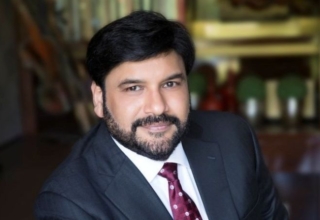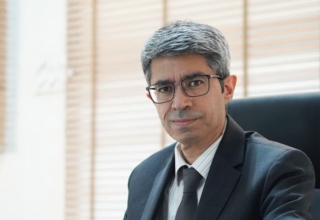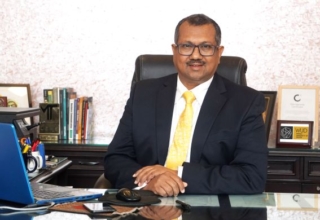
Scholarships are perhaps as old as the civilization itself. An act of empathy for a stranger by a benevolent giver has transformed millions of lives through the ages. In our own country, in modern times, we know some of the finest Presidents to scientists, leaders in various fields are tales of ordinary lives turned into extraordinary successes thanks to somebody gave them scholarships. And this is a continuing societal tradition even now. The current digital tech era is, however, transforming this practice as never before.
Here we will hear from a man who didn’t know about scholarships or web technology till 12 years ago but is today running one of the most successful tech social enterprise/startups in India by handling the most successful and well-known scholarships programs in India and a platform of information on scholarships. Ashutosh Burnwal, Founder & CEO of Buddy4Study.com (esb 2011), a scholarships aggregator, talks about his journey with Autar Nehru.
Please tell us, how did the journey of Buddy4study commence?
There is quite a background story to this journey. Coming from a humble family in Dhanbad (Jharkhand) and one of the five brothers (middle one), I was fortunate to school at a neighborhood private school (Saraswati Shishu Vidya Mandir, Sindri) and get good education while all my brothers went to government school. I did well in class X exams and then cleared IIT JEE after XII and did B Tech at Marine Engineering from Marine Engineering and Research Institute (MERI), Kolkata. I got placed in British Petroleum (BP) as a marine engineer and had a fantastic start to my career. In four years, I had sailed to 25 countries and was earning well. Then, somehow it stuck to my mind that I should do an MBA, so I joined IMT Ghaziabad. I think traits of being born in business family urged me so. It was while at IMT G that the idea and dream of the venture was born.
Sounds interesting.
Yes. It is here that I first heard about NTSE scholarship and came to know, you get Rs 500 under this. It was a big amount at that time and none of us –my family, teachers, the school and even the community—I suppose nobody was aware of it. Had it been so, my younger brother could have also studied in my school and perhaps avoided the later job struggle in life. This feeling disturbed me. My family had sacrificed a lot to educate me at expend of my other siblings and I could relate to how they came together to support me. The importance of scholarships was finding a resonance in my mind.
Then how was the idea of Buddy4study born?
Actually, as part of my project work at IMT and to validate the hypothesis of awareness on scholarships at the level of school, I met between 3000-4000 students in schools of Ghaziabad including top schools in the city. Barring 3-4%, who too had a faint idea, none were knowing anything about scholarships. So, I got the problem statement about lack of awareness about scholarships and then the thought of application of tech to solve this problem at scale gave me the catch. If the relatively smart and educated Delhi NCR students didn’t know it, I could imagine about rest of the places. So I started working on curating scholarship information which is legal and genuine as scammers were notorious even then for stealing personal data etc. The idea was to dig information on scholarship and then disseminate it. And this was not easy.
Why so?
There was no information about scholarships readily available. Google searches would throw up random articles and there were not dedicated columns in media even. So, what I did was to visit my college library at IMT. It had a subscription of 70 plus newspapers and periodicals. For about six months, I would sit in the library for hours in the late evening daily and sift and screen these newspapers for scholarship notices and ads. I collected and curated 65 of them and compiled them for my website.
I believe you met your co-founder Raj Kishore during this phase?
Yes. After having convinced myself about the idea and started curating the information, the next challenge before me was to design and build a website platform that would be a combination of well-known social networking and information sites. But I didn’t know coding and IMT course being full time, there was no option of learning it myself. I had some good savings from my job and I floated the job on a few sites. Some people responded from various places but demanded hefty fees. Then one of my friends told me about his batch mate, Raj Kishore, who was in Noida. He was very humble, affordable and flexible in working. So, we struck the deal and chord. He built the site while I provided the idea and content and two of us spent many nights together to build the web platform.
Okay, then how did you test market your idea?
After the site was done, I went back to those students, teachers, parents and principals to show them my site. They were really happy to see it and loved it. Everyday 50-100 users would register for the site and the number reached to 700 and 12 schools. All this while, we went to schools, conducted sessions to introduce the concept and our project. An interesting thing that happened during this period was my own evolution from a shy marine engineer to a technopreuner. As my English wasn’t good, my batchmates offered me help by coming with me to schools and being IMTian also helped in getting access to school campuses. And finally on Diwali of 2011, that is 26th October, we launched the website.
That’s really a case study straight from a textbook. But still information on scholarships must have been scant and not easily available?
Yes. As Government was and continues to be the largest scholarship provider, we wrote letters to various departments and agencies. Made calls and sent mails etc. But didn’t get the expected response. In fact, there was no consolidated information on scholarships till a few years before National Scholarships Portal. But we continued to enrage with news organizations. A few of them on our instance started scholarship alerts and bulletins. This helped us in visibility and outreach. We became a platform for amplifying the information and also its recipient in some ways. But things took a sharp turn after Government mandated CSR under Companies Act, Digital India happened and more recently by the momentum about philanthropy created by Covid pandemic crisis.
Before we expand how all these events impacted your venture, let’s first hear what kind of scholarships are broadly there for student community in India?
As I said, Government of India through its ministries and agencies is by far contributes the largest share. The states too have their own schemes. If we go on listing important ones, then Ministry of Education (AICTE, NCERT, CBSE); Ministry of Minority Affairs, Ministry of Social Justice and Empowerment, Ministry of External Affairs (for overseas scholarships), Culture and other departments offer a diversity of scholarships. The second category is by corporations, nonprofits, foundations of corporations, NGOs and other institutions. Then universities including foreign HEIs have admission related scholarships and fellowships. Finally, individuals are also providing scholarships through alumni networks, directly or indirectly particularly after Covid impacted people’s income and left some children orphaned as Right to Education takes care only till class 8 and every child studying in a private school would need to pay fee after that.
How is this divided between school and college/university levels?
Apart from NTSE and other scholarships under government schemes, most school scholarships are income and crisis related at least till class X. Then we also have merit cum means schemes. But higher education has bulk of these and mostly merit based. And those in colleges naturally have more need as the expenses multiply. Then girls, special needs children and other groups get dedicated scholarships.
Thanks, it makes a lot of sense. Now let’s come back to your company. What was the turning point that made you realize that now we are a startup in the big league?
With CSR, scholarships from industry increased. For us the Loreal Foundation, which is providing scholarships annually to women, in 2015, proved the talisman. We offered them tech-based solution to implement their scholarship program from application to selection and tracking. And, after its satisfactory result, then we offered to it to many more. Today more than 150 foundations, corporations and renowned non-profits are using our solutions and platform. As scholarships is essentially a seasonal work and the offline process of any scholarship program is resource intensive including time, we provide a tech-based automated interface, which is not only transparent and algorithmic for fair selection but can be monitored from anywhere by the providers. After this, we have also started keeping the database of our alumni scholars and today we have more than 60,000 of them. We’ll be disbursing Rs 180 Cr worth scholarships this financial year.
And how do you earn your revenues?
Mainly from the scholarship program solutions we provide. Depending on the elements or components this is anyway from 5% to 15% of the scholarship amount. And then there are other streams too.
What will be a few major insights from your experience apart from as you said lack of awareness to begin with and then rising growth of scholarships in the last decade or so?
Scholarships are very important and needed. Quite happily these are also growing but at the same time I don’t think these are the panacea for the large need that is there. We need to realize. Last year, we received about 12 lakh applications but only 38,000 got the scholarships. This year 20 lakh applications are competing, and we are going to have 60,000 getting scholarships. That means roughly a conversion of 3%. So, while we need scholarships and more scholarships, yet we have to think beyond scholarships as a country to make funding of education widely available and accessible.
A second insight is that for higher education, a lot of students have to move to a different city, which is culturally so different. Then there is also a lot of gaps in informed career choices and new careers. All this requires personalized mentoring on a scale especially for the impoverished first-generation students and those residing in remote areas. And then we need an education to create right values for sustainability of ethics and good behavior.
Let’s come to these one by one quickly. When you say about education funding, are you hinting at making education loans more accessible? And do you have a solution to offer?
Yes, that is our thinking. We know banks and other BFSIs don’t lend loans that easily. We know even those getting into reputed colleges and courses find it difficult to get the education loans. So, we are working on a concept of a revolving fund where we can promise collateral to the banks so that in case of default EMIs, banks can be assured. This way, we may be able to change the funding culture in the long run.
Can you elaborate on how this is going to happen?
We are studying the legalities of how it could be made a reality and feasible. My model is suppose taking my own case, my family pulling all efforts and resources collected one lakh rupees for my education and after I started earning, I could return that money to the community at large so that another needy personal realizes his or her dream. All our alumni scholars who benefitted know this and if even 50% of them responded to this proposition, we can stand guarantee to thousands, who require it. And then individuals and professionals, who want to support can find this as an indirect way of fulfilling their objective. This way revolving fund will enable millions.
Now throw some light on mentorship program?
When I joined college at MERI, it was a cultural shock for me. I had never thought of it. The opportunities we get and how to avail them. We knew about a few careers but today there are hundreds of options. Need of mentors ad mentorship to guide and talk is much more to navigate this complexity. We have 6500 of them and these range from CEO of companies to eminent people, professionals and experts. We’ll scale it up in future.
You are also preparing some value-based curriculum?
Ethics and empathy must be fundamental to learning and part of education for achieving goals of a progressive and sustainable world. For that matter to achieve the UN sustainable development goals. Then, we see in day today life students are very stressful and at the same time the respect for teachers is waning, the beautiful relationship between teacher and student is also under strain. So, there is the need for transmitting right values to learners and student community and we’re working on it.
In conclusion, how do you look at your journey from here on?
I have been able to bring a lot of awareness and sensitization on scholarships and see when a student gets a scholarship, it is not opening a road for his/her progress, and rather it is also a recognition of his or her potential. His or her family gets to know s/he is special, and it puts more effort to support his/her pursuit. This way we are adding worth to nation’s human capital. And the way we are adding new dimensions to this space and also working on more solutions and mentoring, I am hopeful it is going to be a commendable work as we move forward empowering more and more youth.











